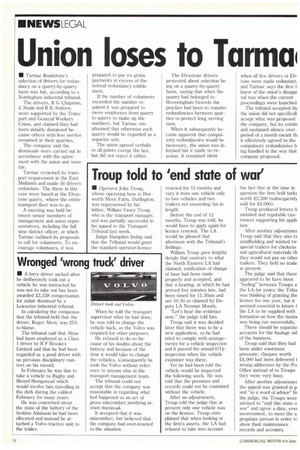Union loses to Tama
Page 12

If you've noticed an error in this article please click here to report it so we can fix it.
III Tarmac Roadstone's selection of drivers for redundancy on a quarry-by-quarry basis was fair, according to a Nottingham industrial tribunal.
The drivers, R G Chapman, C Neale and R K Andrew, were supported by the Transport and General Workers Union, and claimed they had been unfairly dismissed because others with less service remained at their quarries.
The company said the dismissals were carried out in accordance with the agreement with the union and were fair.
Tarmac reviewed its transport requirement in the East Midlands and made 16 drivers redundant. The three in this case were based at the Eivastone quarry, where the entire transport fleet was to go.
A meeting was held between senior members of management and union representatives, including the full time district officer, at which Tarmac outlined its proposals to call for volunteers. To encourage volunteers, it was prepared to pay ex-gratia payments in excess of the normal redundancy entitlement.
If the number of volunteers exceeded the number required it was prepared to move employees from quarry to quarry to make up the numbers, but Tarmac emphasised that otherwise each quarry would be regarded as a separate unit.
The union agreed Verbally to all points except the last, but did not reject it either. The Elvastone drivers protested about selection being on a quarry-by-quarry basis, saying that when the quarry had belonged to Hoveringham Gravels the practice had been to transfer redundancies between quarries to protect long serving men.
When it subsequently became apparent that compulsory redundancies would be necessary, the union was informed but it made no reaction. It remained silent when all five drivers at Ely. tone were made redundant. and Tarmac says the first ii knew of the union's disappt val was when the current proceedings were launched
The tribunal accepted tl-N the union did not specificall accept what was proposed the company, but its contin and sustained silence over. period of a month meant th it effectively agreed to the compulsory redundancies b. ing handled in the way that company proposed.




























































